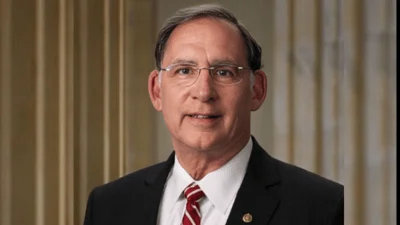I am saddened to have to rise in opposition to this legislation today. As a long-time appropriator, I remember the days when we were always able to come together to determine the funding levels for our government in a bipartisan manner and with little partisan warfare. Unfortunately, this bill is not a product of those times.
I do not say this to blame Chairman Crenshaw or Chairman Rogers, as they have always listened to the concerns that our side has had and have tried to accommodate us when they could. Mr. Crenshaw is a great working partner, and he knows that that famous line is really true in this case: it is not personal; it is about this issue. There are many things we have been able to agree on as a result, but they have also been forced to listen to a portion of their caucus that is not interested in the business of governing, and as a result, the good portions of this bill are overwhelmed by the problems that this legislation has.
Let me discuss just a few of the more serious shortfalls of this bill, starting with a seriously inadequate allocation. This subcommittee received an unacceptably low 302(b) allocation that is $566 million below last year's bill. Percentage wise, this is a cut of 2.6 percent, a level that no other subcommittee has been forced to take. The result is that there are several agencies in this bill that are not funded properly.
Primary among these is the Internal Revenue Service. The IRS is funded at $10.95 billion, a cut of $341 million below last year. This means the agency would operate at a level that is below sequestration--funding levels that were already grossly inadequate. I assume this is being done both as some sort of collective punishment of the Exempt Organizations unit for the problems associated with their scrutiny of liberal and conservative 501(c)(4) organizations, and as one final attempt to hinder the implementation of the Affordable Care Act. We already heard from the chairman that they don't think this committee should be involved with the Affordable Care Act. We keep forgetting that it was passed by both Houses, signed by the President and upheld by the Supreme Court. These actions are irresponsible, and they do more to hurt the American people than does the IRS. Rather than investing in further training to prevent the problems that happened previously or ensuring that we have the resources to go after tax cheats, the majority has chosen to play politics with the agency that brings in the vast majority of our Nation's revenue. Unfortunately, these funding levels will prevent the agency from collecting money from tax cheats, expand the tax gap, and increase our deficit. Talk about fiscal irresponsibility.
The Securities and Exchange Commission is also severely underfunded at a level of $1.4 billion. This is $300 million below the request and is simply insufficient to allow the agency to properly oversee Wall Street and protect investors, including many retirees who have 401(k) and pension plans that are invested in the marketplace. Both parties have created additional responsibilities for the SEC in recent years, but funding has not kept pace. If we keep asking the agency to do more with less, then we cannot be surprised if we experience another financial crisis.
There are numerous other cuts to the bill that are harmful as well, including the elimination of the Election Assistance Commission, cuts to the Consumer Product Safety Commission, the Federal Communications Commission, and the General Services Administration, all of which have negative impacts on the operations of our Federal Government and private sector job growth. However, I believe that the biggest impediment to reaching compromise on this bill is the large number of partisan riders that have been added. Let me name just a few of the more excessive, all of which are major concerns to our side of the aisle.
There are riders preventing the IRS from implementing the Affordable Care Act and from reforming the 501(c)(4) regulations, which have caused so much confusion and abuse. There is a rider limiting Americans' ability to travel to Cuba on people-to-people visas.
[Time: 19:30]
There is a rider preventing the SEC from requiring publicly-traded companies to disclose their campaign donations to their shareholders, even though there is no indication that the agency has plans to do so.
There is a rider that prevents the provision of abortion services in multistate health plans under the Affordable Care Act.
There are riders preventing the District of Columbia from using its own funds to provide legal abortion services to low-income women and to determine its own local criminal justice laws with regard to marijuana.
This is, by no means, an exhaustive list. The number of riders on this bill seems endless. I have no doubt that we will be asked to add even more to this list during debate on this bill.
Before we do that, I would point out that we have spent a lot of time this year discussing how to ensure a return to regular order in the appropriations process. I would suggest that it is extremely difficult to do so when the majority attempts to pack legislation with a laundry list of partisan priorities.
This is irresponsible governing, at best, and they make a mockery of one of this institution's most important functions, to fund the Federal Government.
When we choose politics over the needs of the American people, we should not be surprised when those same people become cynical about their elected representatives. The appropriations process is not and should not be the place to add every partisan priority that the other side cannot pass through the regular legislative process.
I feel confident that the American people would rather just have us get on with our jobs, instead of rehashing the same arguments over the Affordable Care Act, Dodd-Frank, and many other issues.
Our side will attempt to remedy some of these defects through the amendment process; although with the inadequate allocation, it will be difficult to do so. Unfortunately, as it is currently written, this is not a bill that I can support.
Before I finish, let me take a moment to thank the staff on both sides of the aisle for their hard work on this bill. They have all devoted many hours to creating this bill and report, and I know I speak for all the Members on our side when I say that we are grateful for the hard work that they have put into this bill.
Source: U.S. Department of HCA







